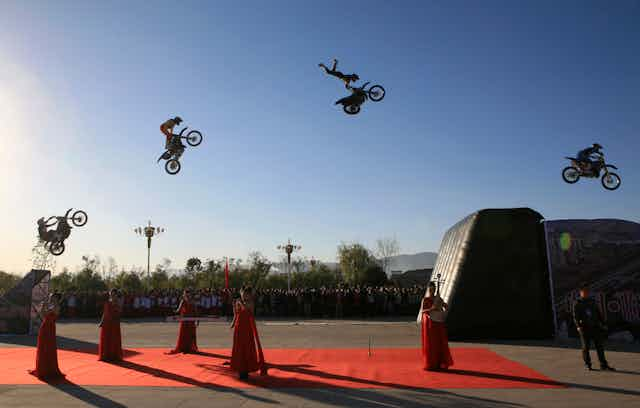We all have heard it said that sport is like religion. The annual cycle of sporting events mimics the yearly sequence of rituals by which traditional religions transform “profane” time and space into “sacred” moments and places. Such regular and repeated experiences lift athletes and fans alike beyond everyday concerns.
Clearly, most team sports elicit a sanctity between the players and their fans. However, there is more to connect sport and religion than transcending daily life. If we focus less on team sports and more on sport as an individual challenge, personal faith appears on the horizon. Sport is a call to spiritual adventure.
Thousands of the faithful will flock to the Australian leg of the Moto Grand Prix on Phillip Island tomorrow, for three days of high-octane racing. The outcome of the overall Grand Prix was essentially decided last Sunday, when Spaniard Marx Marquez won the Japanese Grand Prix with a decisive 77 points. Yet the fans will gather to cheer on their favourites and watch some world-class racing.
Motorbike riders, like the sprinter and the cross-country runner, the lone mountain climber and the hang glider, are individual athletes. They are not caught up in the collective excitement of team sports that mimic the pomp and ceremony of high religious rites.
The individual faces the possibility of success or failure alone, usually deep within the self. Will I increase my personal best time, runners may ask. If I eventually make it to the top of the mountain, will I be able to return to base camp safely, a climber wonders.
In effect, an athlete puts his or her life on the line, at least as a rehearsal of victory and personal renewal and its polar opposite, namely, physical and emotional failure. These represent variations on the all-encompassing theme of human existence writ large: to live and be reborn whilst hurtling inexorably toward death.
One motorbike rider has spoken of his sport as a “dance” that fuses together time and space:
the attraction of riding comes from achieving total presence on the bike. At these moments, the past only contains the last few curves, the future exists just as far ahead as I can see, and the present consists of me, the motorcycle and the road.

Sometimes sportspeople confront death in a literal sense. BASE jumper Omer Mei-Dan leaps from fixed structures like tall buildings, with only seconds to safely open his parachute. He said in an interview with the Jewish Telegraphic Agency,
I like being afraid, I like the fear, I enjoy it … In BASE jumping, every small thing dictates life or death. It makes me feel vibrant.
Knowing when to rejoice is one thing, but wisely knowing when to give up trying is another. Such is the journey of faith, the grist of a human spiritual life. Being Buddhist, Christian, Muslim or any other kind of religious practitioner is, from this point of view, somewhat beside the point.
Athletes move toward their own spiritual confession without the usual trappings associated with traditional religions or religious practice. This kind of faith, based on vitalising experiences of spirituality, is thoroughly secular.
Despite Mei-Dan’s close brushes with death, he does not appeal to a higher power:
No prayers will come out of this mouth … I’m more atheist than anything else.
Sport can increase spiritual awareness in so far as athletes embrace the tension between renewal and failure from moment to moment, which makes sport a ritual activity.
Rituals are highly significant for both athletes and fans. Valentino Rossi, one of the most successful motorcycle racers of all time, famously starts every race by kneeling beside his bike and “talking” to her.

But rituals are not only about personal ceremonies. Risk-taking deepens and intensifies the experience, creating a ritual encounter with the power of life and death at each “bend” of bike and rider into the turns of the course.
Record-breaking performances and “personal bests” are one thing. However, in times of heightened awareness – what’s called being “in the zone” – spiritual insight is possible, a transcendent perspective on life itself.
Great religious leaders have shown us how to address the tension between renewal and failure in all experience, especially when personal stakes are high: Jesus “played the game” of reckoning with mortality and went to his cross a failure. However, the cross itself has become a source of Christian renewal or resurrection.
The Buddha also struggled to come to grips with his failure to find contentment and happiness. Only when he gave up his quest for these things and embraced suffering as the intractable nature of existence did he, paradoxically, find spiritual renewal in enlightenment, or nirvana.
And Muhammad was at first anguished by self-doubt and poor self-esteem, feeling like a failure in life. However, he then accepted himself as he was and, again by a paradox, found spiritual renewal when he fully submitted his life selflessly to his god, Allah.
Ritual, coming to terms with failure and suffering, and facing one’s own mortality create faith and transcendent experiences. Religion does not have a monopoly on these experiences – under the right circumstances, sport can become a powerful secular spiritual practice.

